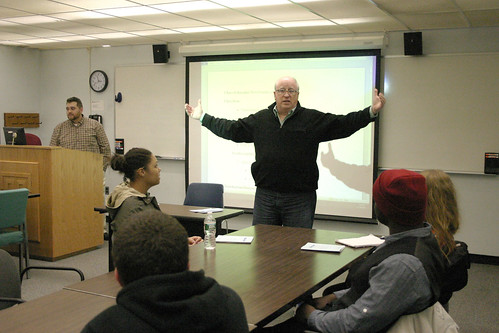
Political science professor Nicholas D’Arreca and sociology professor David Allen introduce their passion for civil rights activism to their students.
On May 4, 1970, four students were killed and nine were injured, one of whom was subsequently permanently paralyzed. What had begun as a peaceful protest at Kent State University in Kent, Ohio ended as what is now referred to as the “Kent State Massacre.” Less than a week after then-President Richard Nixon ordered an invasion into Cambodia, more than 2,000 Kent State students mobilized on its campus to protest at noon. Despite the National Guard’s attempts to disperse the crowd with tear gas, the students remained. Approximately 24 minutes later, Sgt. Myron Pryor and 28 other Guards opened fire on the students, using a reported 68 rounds of ammunition total.
The history of collegiate protesting is one tainted with bloodshed and tense student-official relations, with Kent State as the poster child. Yet, more than 40 years after the Kent State Massacre, some professors on Main Campus are not only encouraging activism, but also offering extra credit to their students who do engage, such as Nicholas D’Arreca and David Allen.
In 2004, the ONE campaign was founded by the conglomeration of several international humanitarian foundations and Bono of U2. Since its inception, the international, non-partisan and non-profit grassroots campaign has procured more than 2.5 million members and continues to advocate the accountability of world leaders, according to its website.
Closer to North Broad, though, political science professor D’Arreca brings the ONE campaign into his classroom through his activist efforts and extra credit opportunities he offers to his students.
“I do not require or expect students to share my passion and commitments,” said D’Arreca, the politics of identity in America general education course instructor. “Instead [I] merely expose them to some things they might not know about.”
D’Arreca added that he is passionate about the mission of ONE, and wants to communicate the value of active engagement to his students.
And, unlike the textbook classroom discussions, global issues are not only a hot topic in D’Arreca’s classes, but it is also in the public eye.
ONE’s mission, according to its website, “is to fight extreme poverty and preventable disease in the poorest places on the planet, particularly in Africa, where the challenges are the greatest.” The organization is currently working on a campaign for World AIDS Day on Dec. 1 called “The Beginning of the End of AIDS.” It will be a live discussion panel featuring former presidents George W. Bush and Bill Clinton, Bono, Alicia Keys, members of the Elisabeth Glaser Pediatric AIDS Foundation and others, which will be powered by YouTube.
Sociology professor David Allen is also encouraging his students to protest and become actively involved in political movements in their communities.
Allen said he began his role as an actively engaged citizen as a college student, with the Civil Rights and Black Power movements as the backdrops in the 1960s and 1970s. In the 1980s, however, Allen said he took a break from his activist lifestyle as he said he didn’t see a revolution on the horizon. With this hiatus, he went to the University of California Berkeley to receive his Ph. D. in sociology. It wasn’t until Barack Obama’s 2008 presidential campaign that Allen said he returned to activism, about which he said he is very passionate.
Surrounded by stacks of political commentary and sociology textbooks in his office, Allen related the Occupy Movements cropping up throughout the world back to these movements.
“Is there something other than capitalism,” Allen, an ethnicity and the immigrant experience in the U.S. general education course professor said. “This is what people are ultimately questioning through the Occupy Movement.”
In conjunction with his Occupy-themed lessons, Allen said he also encourages his students to read political theory so they know how to change the world with big ideas.
“I have seen an upsurge of activity among youth, and this encourages me to continue being actively engaged in social movements,” Allen said.
Allen said, teaching necessitates understanding the way his students see the world.
“Teaching my students reminds me of who I am and gives me a great sense of encouragement. My students keep me young,” he said.
“People don’t believe in an alternative vision anymore,” Allen added. “We have to return back to an alternative vision if true change is going to come, it is not clear what the future looks like or where we should be heading. There is a widespread sense the future is not clear, people ultimately want to know how to translate ideas into reality. There are ideas floating around about how to bring about change however they need to be manufactured.”
Alexis Sachdev and Priscilla Ward can be reached at living@temple-news.com.


Where was that article saying that teachers don’t let their bias seep into their teaching…?